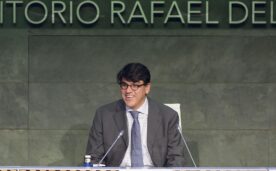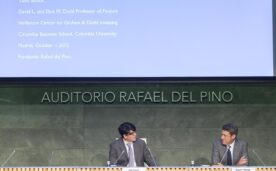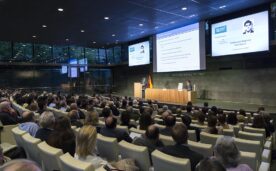Spain and the future of the Eurozone
Summary:
The European Monetary Union (EMU) has design flaws that have not yet been resolved. This is one of the main conclusions of the conference that Tano Santos, Professor of Economics at Columbia University, gave on 13 October at the Rafael del Pino Foundation. Santos began his speech by asking why the euro exists. The high degree of trade integration of the countries of the European Union, the need to protect the EU institutions created between the signing of the Treaty of Rome in 1957 and the collapse of the Bretton Woods international monetary system in 1971, the existence in the EU of structural transfer mechanisms (such as the common agricultural policy), the fight against inflation and the credibility of the German Bundesbank in this respect, the need to provide political cover for fiscal consolidation processes and Germany's dual need, on the one hand, to find its place in Europe after reunification and, on the other, to avoid the problems of the strengthening of the mark, explain the creation of the single European currency. But above all, the euro exists because European integration exists. The next question, therefore, is why the European Union exists. There are three types of answer to this question. For the fathers of Europe, such as Jean Monnet or Robert Schuman, the EU exists because what it is intended to create is a political union: the United States of Europe. For the functionalists, such as Ernst Haas, its creation is due to a technical question of economic efficiency. The third response focuses on Europe as a creation of the nation state, which allows countries to give up collateral sovereignty in order to develop national policies, such as those related to the welfare state or political and social stability. The latter response best fits the adaptation of EU countries to the breakdown of the Bretton Woods system. This adaptation set limits to national policies and erased the differences in economic policy between conservatives and social democrats. This explains some of the eurozone's design problems. Other design problems of the eurozone relate to Germany's reluctance to the common currency, which resulted in a premature adoption of the euro and German control of the design of the European Central Bank, in the image of the Bundesbank, which does not correspond to the problems and needs of today's world. Added to this is the desire of several countries to overcome their institutional weaknesses by adopting the euro. More specifically, the errors in the design of the Eurozone are centred on four elements: that it was created without effective mobility of the labour factor, that countries with very different institutions have been integrated, that there are strong nominal rigidities in many of them, which lead to adjustments in times of crisis being made via quantities and not via prices, and that its members have different economic policy problems. These design errors can be resolved, but there is a problem of will that prevents it. This is the reluctance of several members, including Germany, to mutualise risks with other countries. In addition, there is what is known in the economic literature as the agency problem, since the mutualisation of risks removes incentives to carry out fiscal adjustments. From this perspective, the Banking Union is an important achievement but it does not solve the problem insofar as the European Stability Mechanism (ESM) prevents the mutualisation of risks. The EU is thus prepared to finance bailouts but not to take losses. This is logical if one takes into account the rise of populist parties, with their proposals to default on debts and renounce fiscal stability, which has occurred in several of the countries that have suffered most from the euro crisis. Moreover, the whole system for dealing with banking crises suffers from another major flaw: it lacks a European deposit guarantee fund. What implications does all this have for Spain? There are two possible scenarios. The first is that of non-acceptance, as proposed by the CUP, Podemos or Syriza, with serious consequences for the Spanish economy. The second is acceptance, which begins by establishing more realistic debates on the need for fiscal stabilisation, flexibility to avoid adjustments via quantities (production and employment), and on the need to adjust wage developments to productivity, to remove obstacles to the increase in the size of companies and to focus on the foreign sector. For all this, it is important to carry out an internal pedagogical exercise because the euro implies real adjustments, which may lead to increases in inequality that must be dealt with, and because the concept of risk must be reintroduced into society. This is a debate that must be opened in Spain and in which our country must make its voice heard and play a role as an actor in Europe, instead of being absent from it as it has been until now. <em>This document summarises what was discussed during the meeting held for this purpose at the Foundation. The Rafael del Pino Foundation is not responsible for the comments, opinions or statements made by the people who participate in its activities and which are expressed as a result of their inalienable right to freedom of expression and under their sole responsibility.</em> <p class="»blank»">[nggallery id=222]</p> <!–more–>
The Rafael del Pino Foundation is not responsible for the comments, opinions or statements made by the people who participate in its activities and which are expressed as a result of their inalienable right to freedom of expression and under their sole responsibility. The contents included in the summary of this conference are the result of the debates held at the meeting held for this purpose at the Foundation and are the responsibility of their authors.
The Rafael del Pino Foundation is not responsible for any comments, opinions or statements made by third parties. In this respect, the FRP is not obliged to monitor the views expressed by such third parties who participate in its activities and which are expressed as a result of their inalienable right to freedom of expression and under their own responsibility. The contents included in the summary of this conference are the result of the discussions that took place during the conference organised for this purpose at the Foundation and are the sole responsibility of its authors.






